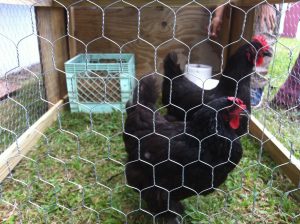
Welcome to fall in Florida! During this time of the year our weather patterns start to shift, and with this come new challenges. If you own chickens, you know that you have an obligation to raise your animals with their safety as a priority. In the wild chickens, ducks, quail, and other domesticated birds are considered prey. This means that your animals are on the menu for all kinds of wildlife. During this time of the year, it is especially important to be aware of the predators that can pose a threat to your backyard poultry.
Predation is natural
A variety of predators that find your chickens tasty are found in Florida. These include hawks, owls, snakes, raccoons, foxes, and coyotes. These predators can kill your poultry, terrorize the colony, damage your facilities, and also feed on eggs. Adding stress to your backyard chicken will disrupt normal routines such as feeding and resting, leading to a decline in egg production or weight gain.
Ruling the roost: protecting your poultry
There are a few things that backyard poultry enthusiasts can do to protect their flocks from predators. Some of the most important steps include:
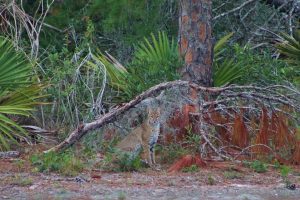
- Investing in secure chicken coops and runs: The coop should be made of sturdy materials, such as wood or metal, and all openings should be covered with welded wire-based hardware cloth or other strong wire mesh. The coop should also be raised off the ground to prevent predators from digging under it. Alternatively, you can dig a trench and bury welded wire outwards up to 2 ft to discourage digging.
- Providing a covered run: A covered run will protect chickens from
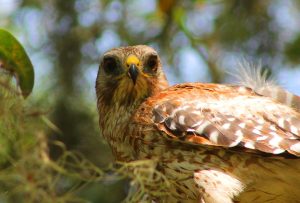
Red-shouldered Hawk (Buteo lineatus) is a common predator of backyard chickens. Picture credit: Jonael Bosques, UF/IFAS. aerial threats such as hawks and owls. The run should be made of the same sturdy material as the coop and should have a secure roof. Tin or wooden roofs are encouraged. Your design should be predator-proof while at the same time provide enough airflow inside the coop and run to be comfortable for your birds to live and take refuge in it.
- Keeping chickens locked up at night: This is one of the most effective ways to protect birds from predators. Many predators such as raccoons, coyotes and bobcats prefer to hunt at night than in broad daylight.
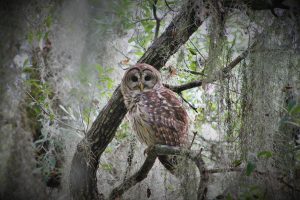
Barred owls (Strix varia) are night predators. Proactive protection of our flocks by locking them inside the coop at night will greatly decrease the chances of predation. Picture credit: Jonael Bosques, UF/IFAS. - Removing attractants: Predators are attracted to food and water, so it is important to keep the area around the chicken coop clean and free of debris. Food and water should be placed inside the coop and run, and any uneaten food should be removed routinely. Messy surroundings will also attract rodents, wild birds, which might carry unwanted diseases that will affect your poultry.
- Using deterrents: There are a number of deterrents that can be used to scare away predators, such as motion sensor lights, electric fencing, and guard animals.
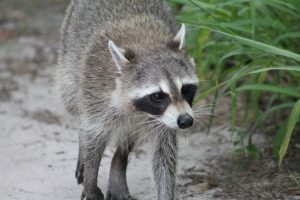
Racoons (Procyon lotor) are common predators of backyard poultry. Commonly they hunt in teams, where one individual scares chickens, while the other grabs the pray. Picture credit: Jonael Bosques, UF/IFAS.
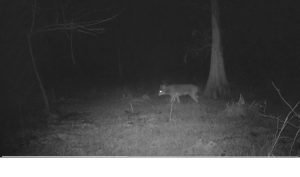
Be proactive: be prepared
In addition to the steps listed above, there are a number of other things that backyard poultry enthusiasts can do to protect their flocks from predators in Florida:
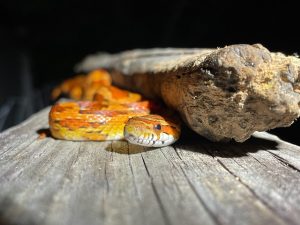
- Be aware of common predators in your area: Different predators are more common in certain areas than others. If you are willing to invest in a wildlife camera to strategically place around your coop, it will give you an idea of what happens after dark in your backyard.
- Inspect your coop and run regularly: Make sure that there are no holes or gaps in the fencing that predators could get through. You should also check for any signs of predators, such as tracks or droppings.
- Be vigilant: Keep an eye on your chickens when they are outside and be prepared to take action if you see a predator.
- If you have questions, contact your local Extension Agent. We can help you identify potential stressors that may affect the wellbeing of your backyard poultry flock.
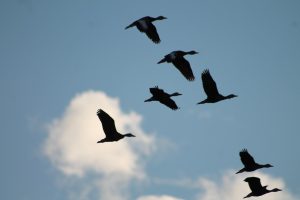
Wild birds like the Black-bellied whistling duck (Dendrocygna autumnalis) can transmit diseases that can affect the productivity of our backyard chickens. Picture credit: Jonael Bosques, UF/IFAS.
Conclusion
By taking the necessary steps to protect their flocks, backyard poultry enthusiasts can enjoy raising chickens, ducks, and other poultry in Florida without having to worry about predators. If you would like more information on backyard poultry production, predator protection, poultry nutrition, or any other topic related to backyard poultry science, please contact UF/IFAS Extension Hardee County at 863-773-2164 or drop by. We are located at 507 Civic Center Drive, Wauchula FL 33873.
Further Reading
AN239/AN239: Raising Backyard Chickens for Eggs (ufl.edu)
Protecting Small Poultry Flocks from Predators | Oklahoma State University (okstate.edu)
What are the best ways to protect my chickens from predators? | Extension (unh.edu)
VM132/VM097: Newcastle and Infectious Bronchitis Vaccine Reactions in Commercial Broilers (ufl.edu)
PS38/PS032: Avian Influenza in Poultry (ufl.edu)
Source: UF/IFAS Pest Alert
Note: All images and contents are the property of UF/IFAS.



